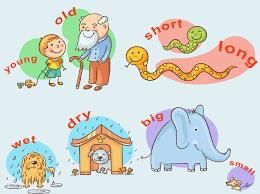Year 6 Exam > Year 6 Notes > Year 6 English > What are synonyms and antonyms?
What are synonyms and antonyms? | Year 6 English PDF Download
Synonyms
Synonyms are words that have similar meanings. They can be used interchangeably to add variety and depth to our language.
- Words like happy, cheerful, and merry are synonyms. They all convey the idea of joy and positivity.
- On the other hand, words like sad, miserable, and heartbroken are synonyms that describe feelings of unhappiness and sorrow.

Antonyms
Antonyms, on the contrary, are words with opposite meanings. They provide contrast and help in expressing nuanced ideas.
- For example, angry and peaceful are antonyms. They represent conflicting emotional states.
- Similarly, funny and serious are antonyms that convey completely different tones or moods.
Remember, a thesaurus is a valuable tool for discovering synonyms and antonyms. It can enrich your vocabulary and make your writing more expressive.
Question for What are synonyms and antonyms?Try yourself: Which of the following pairs of words are synonyms?View Solution
The document What are synonyms and antonyms? | Year 6 English is a part of the Year 6 Course Year 6 English.
All you need of Year 6 at this link: Year 6
|
26 videos|58 docs|10 tests
|
FAQs on What are synonyms and antonyms? - Year 6 English
| 1. What are synonyms and antonyms? |  |
Ans. Synonyms are words that have similar meanings, while antonyms are words that have opposite meanings.
| 2. How are synonyms and antonyms useful in language learning? |  |
Ans. Synonyms and antonyms help expand vocabulary, improve writing skills, and enhance communication by providing alternative words to convey different shades of meaning.
| 3. Can you provide examples of synonyms and antonyms? |  |
Ans. Examples of synonyms include happy and joyful, while examples of antonyms include hot and cold.
| 4. How can students effectively use synonyms and antonyms in their writing? |  |
Ans. Students can use synonyms and antonyms to avoid repetition, add variety to their writing, and convey their ideas more precisely.
| 5. Where can students find resources to help them learn more synonyms and antonyms? |  |
Ans. Students can use online thesauruses, vocabulary-building apps, and language learning websites to explore a wide range of synonyms and antonyms.
Related Searches















